There are a lot of great lines in the movie The Commitments. One of my favorites is when Jimmy Rabbitte tries to inspire the band members to play soul music by showing them a video of James Brown performing. Dean Fay takes it all in and asks “Do y'not think, uh - we're a little white for that kind of thing?” Recent Democratic Party nominees in special election House districts may be asking the same question.
This thought hit me recently when I saw the Massachusetts Democratic Party tweet out a plug to support three nominees:

These Democrats all won competitive special election primaries that occurred on February 2. Let’s start with the Ninth Plymouth District (Brockton) demographic breakdown based on 2010 Census data, from the legislature’s redistricting site:
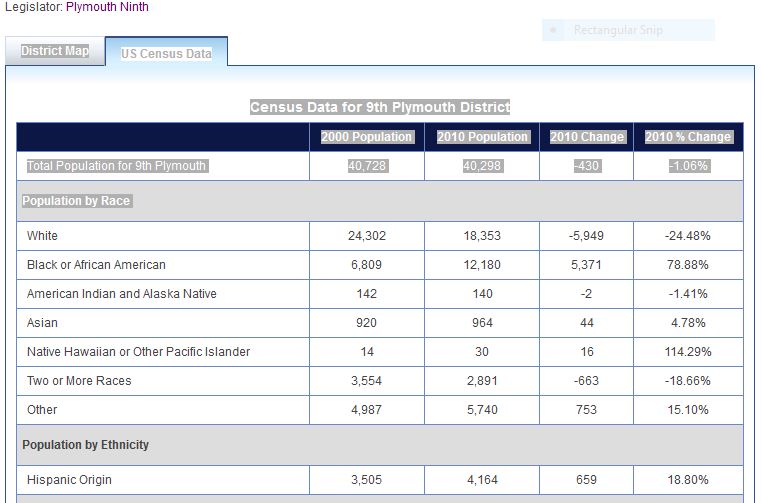
The White population is by far the largest group, but not a majority in the district.
But by 2016, there is reason to believe that a minority candidate might have even better prospects based on updated demographics published by statisticalatlas.com (SA). The district breakdowns presented below are different because SA is using data from the latest (2009-2013) five year American Community Survey (ACS), conducted by the United States Census Bureau. According to SA’s Orna Kretchmer the ACS is a statistical sample of the nation's population; estimates in ACS are based on statistical extrapolations. The census and ACS don’t agree exactly because of changes over time and inaccuracies in ACS sampling-based extrapolations. Nonetheless, ACS is important in mapping out community change and in allocating up to $400 billion in federal funds each year.
When you look at the legislature’s numbers, the subcategories under race will add up exactly to the total population in the district. Then the total Hispanic population is provided under Ethnicity. SA presents it differently: for Whites, it counts only non-Hispanic Whites. For Blacks, it excludes Black Asians and Black Hispanics. Here is how SA sees the updated composition of the Ninth Plymouth District:
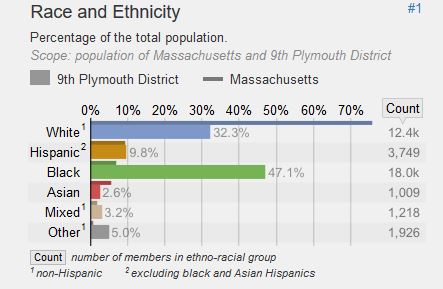
It looks like the White and Black populations have nearly reversed; the district is now almost majority African-American and its status as minority-majority has greatly enhanced. The White population has dropped to 12,400, the Black population has risen to 18,000. Why such a shift? Ms. Kretchmer suggests that because the White population in 2010 was relatively old and the African American population much younger, such a change isn’t all that surprising.
Let’s go through the same exercise for the Third Worcester District which includes Fitchburg, first from the legislature’s redistricting site:
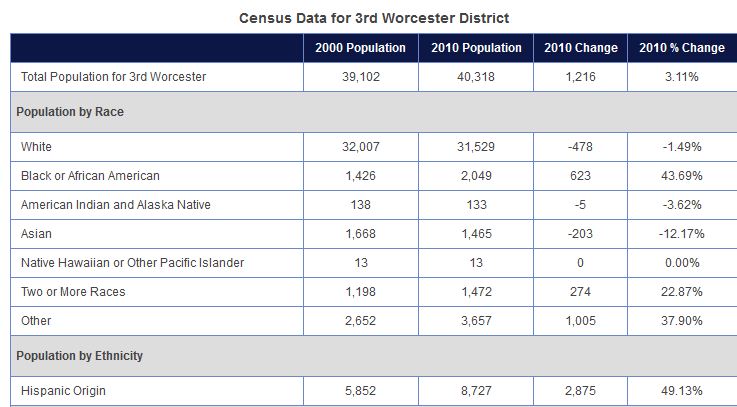
Here is the Third Worcester District, from SA:
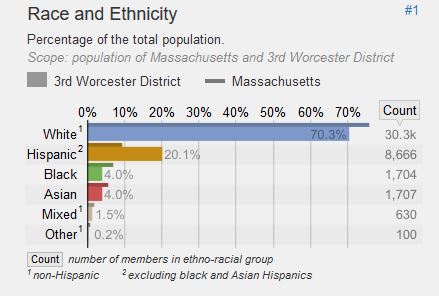
Viewing the population as SA does, it appears that the district is about thirty percent minority, including twenty percent Hispanic.
Here is the Twelfth Essex District from the legislature’s site:
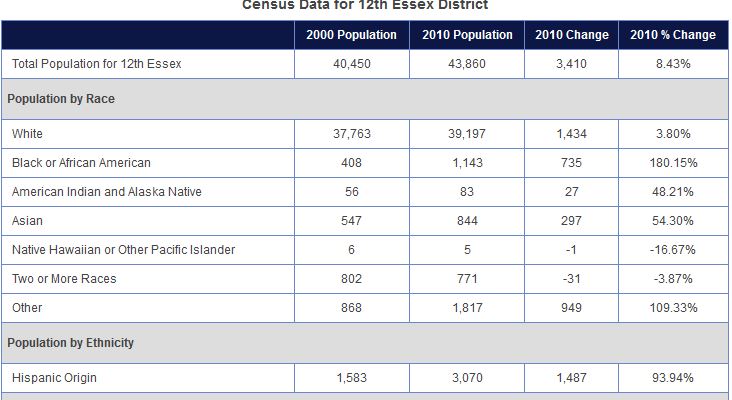
As SA presents it, the Twelfth Essex has a minority population of fourteen percent, almost 8.5% Hispanic:
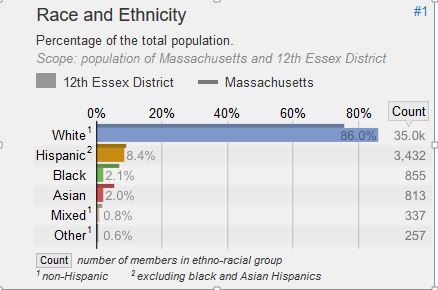
The Democratic primary in the Ninth Plymouth featured former City Councilor Gerry Cassidy against two women candidates, both of whom are sitting city councilors. One of the contenders was Brockton City Councilor At-Large Shayna Barnes, an African-American woman. In the Third Worcester, one of the defeated primary opponents was an African-American woman, Kimatra Maxwell. Ms. Maxwell is a social worker and a first-time candidate. She had endorsements from MassNow, SEIU Massachusetts State Council, and others. So in those two districts the Democrats were able to attract strong minority women candidates, but they did not prevail in the primaries.
What about the Republicans? No Republican ran in the primary or succeeded as a write-in in the Ninth Plymouth. It would have been a great occasion to run a minority candidate in a district that is getting younger and more diverse.
In the Third Worcester no Republican made the ballot, but Fitchburg City Councilor Dean Tran secured enough write-in votes to face off against Hay in the final. The Massachusetts Republican Party identifies Tran as the first person of color to be elected citywide in Fitchburg.
The Republican primary in the Twelfth Essex featured a contest between two women candidates. Stephanie Peach will face off against Walsh in a race to succeed Republican Leah Cole.
This isn’t to disparage any of the prevailing candidates. Primaries are competitive and I’m sure if they win their special elections they will take the responsibility to represent all of their districts seriously. Still, on February 2, the Republican Party seized opportunities that the Democratic Party missed.

